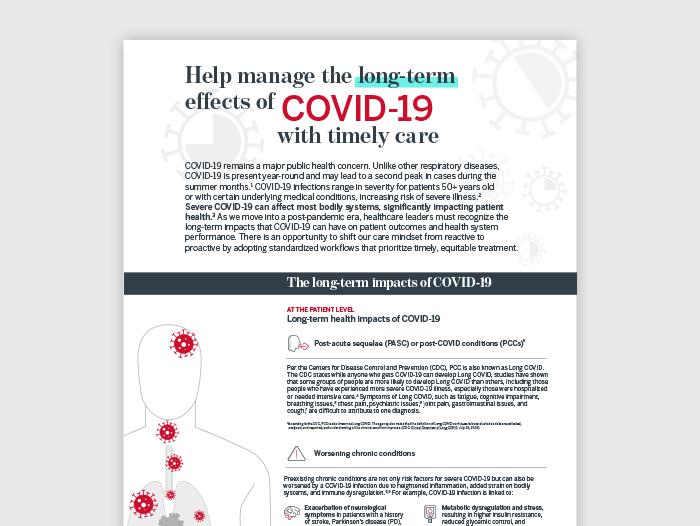Auto logout in seconds.
Continue LogoutAccording to a new study published in the New England Journal of Medicine, long COVID may lead to marked cognitive decline equal to a drop of six IQ points compared to those who have never been infected.
Study details and key findings
For the study, researchers from Imperial College London invited 800,000 adults in England to complete an online cognitive assessment, which consisted of eight tasks. The eight tasks evaluated skills such as verbal reasoning, spatial planning, word definitions, and several aspects of memory.
Overall, 112,964 participants completed the assessment. Among the participants, around 46,000 said they had never had COVID-19. A similar number had been infected, but their illness lasted less than four weeks. Around 3,200 participants had post-COVID-19 symptoms that lasted four to 12 weeks after their initial infection, and about 3,900 had symptoms beyond 12 weeks, with some lasting a year or more.
At the time of the cognitive assessment, 2,580 participants reported that they were still experiencing symptoms after their initial COVID-19 infection.
Overall, the researchers found that participants who had long COVID symptoms lasting more than 12 weeks scored the equivalent of six IQ points lower than those who had never been infected. Participants who reported symptoms that lasted four to 12 weeks also scored three IQ points lower than people who had never had COVID-19.
Individuals who had been sick enough to require hospital care had the largest difference, scoring nine IQ points lower than those who had never been infected.
However, the researchers also found that participants whose persistent symptoms had resolved by the time they took the test performed as well as those who had symptoms lasting a shorter amount of time — suggesting that cognitive impairment related to long COVID may ease if symptoms improve.
"What our study shows is that brain fog can correlate with objectively measurable deficits in a person's actual memory and executive task performance," said Adam Hampshire, a professor of restorative neurosciences at Imperial College London and the study's lead author.
The researchers noted several limitations to their study, including that they relied on self-reported symptoms rather than diagnoses of long COVID. In addition, the majority of participants were white, and more than half were women. There were also more participants from affluent areas than areas that were economically struggling.
Commentary
According to the researchers, the differences they observed between groups were modest and only measured at a single point rather than over time. Because the standard deviation for IQ is roughly 15 points, a shift of three or even six points may not be that impactful.
However, health experts say it's not clear how even a small shift in cognitive function may affect people over a long period of time.
James Jackson, a neuropsychologist at Vanderbilt Medical Center, noted that even small differences can be meaningful for certain people. For example, "if you're an engineer and you have a slight decline in executive functioning, that's a problem," he said.
"The issue is: Are people able to function in their routine capacity in whatever they are doing? And this is not really answered by 3 points more or less," said Igor Koralnik, the chief of neuro-infectious diseases and global neurology at Northwestern Medicine.
"The determination of X points on an I.Q. scale is less important than the people's perception of their cognitive difficulties," Koralnik added.
Separately, Paul Elliott, chair of epidemiology and public health medicine at Imperial College London and the study's senior author, said there are also hopeful signs in the study's findings, particularly since a third of people who reported long-term cognitive symptoms saw them resolve.
"The important thing is that if they had persistent symptoms and then those symptoms resolved, they looked cognitively like the other people who'd had Covid, the short-duration people," Elliott said. "I think it's encouraging that if once it resolves and you no longer report symptoms, then basically you look much more like everybody else who'd had Covid, rather than looking like the people who've still got ongoing symptoms."
In addition, Steven Deeks, an infectious disease specialist at the University of California, San Francisco, said the study's findings may help pave the way for long COVID treatments in the future.
"We need drug companies to get involved and make and design their own studies and fund their own studies, particularly Big Pharma," Deeks said. "Perhaps this paper will provide a road map to some endpoints that will make it easier to design a study, to power a study, to fund a study, to conduct a study, to interpret a study." (Belluck, New York Times, 2/28; Cooney, STAT, 2/28; Hampshire et al., New England Journal of Medicine, 2/29)
Several health systems have set up dedicated recovery clinics to help treat and coordinate care for long-haulers. This resource provides an overview of COVID-19 recovery clinic models pioneered by two early adopters — The University of Iowa Hospitals and Clinics and the University of Pennsylvania Medicine — and considerations for assessing whether it is a model you should pursue.
Don't miss out on the latest Advisory Board insights
Create your free account to access 1 resource, including the latest research and webinars.
Want access without creating an account?
You have 1 free members-only resource remaining this month.
1 free members-only resources remaining
1 free members-only resources remaining
You've reached your limit of free insights
Become a member to access all of Advisory Board's resources, events, and experts
Never miss out on the latest innovative health care content tailored to you.
Benefits include:
You've reached your limit of free insights
Become a member to access all of Advisory Board's resources, events, and experts
Never miss out on the latest innovative health care content tailored to you.
Benefits include:
This content is available through your Curated Research partnership with Advisory Board. Click on ‘view this resource’ to read the full piece
Email ask@advisory.com to learn more
Click on ‘Become a Member’ to learn about the benefits of a Full-Access partnership with Advisory Board
Never miss out on the latest innovative health care content tailored to you.
Benefits Include:
This is for members only. Learn more.
Click on ‘Become a Member’ to learn about the benefits of a Full-Access partnership with Advisory Board
Never miss out on the latest innovative health care content tailored to you.


